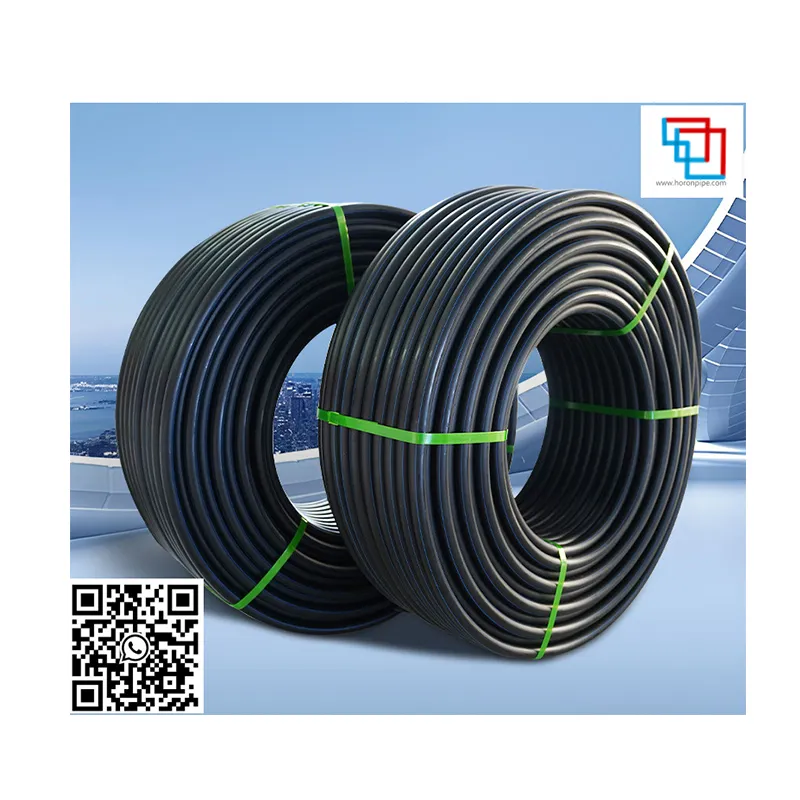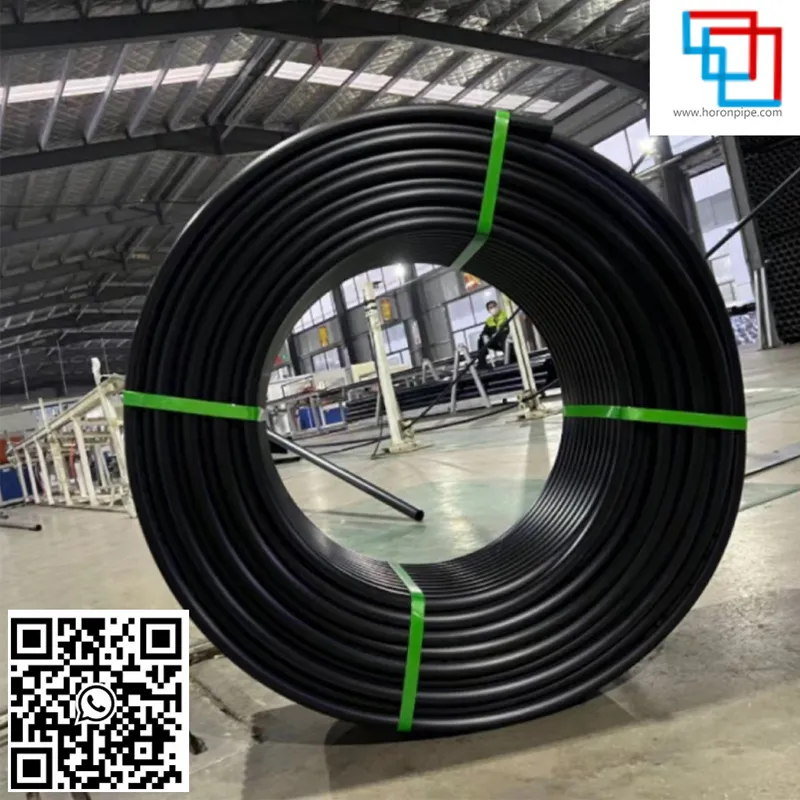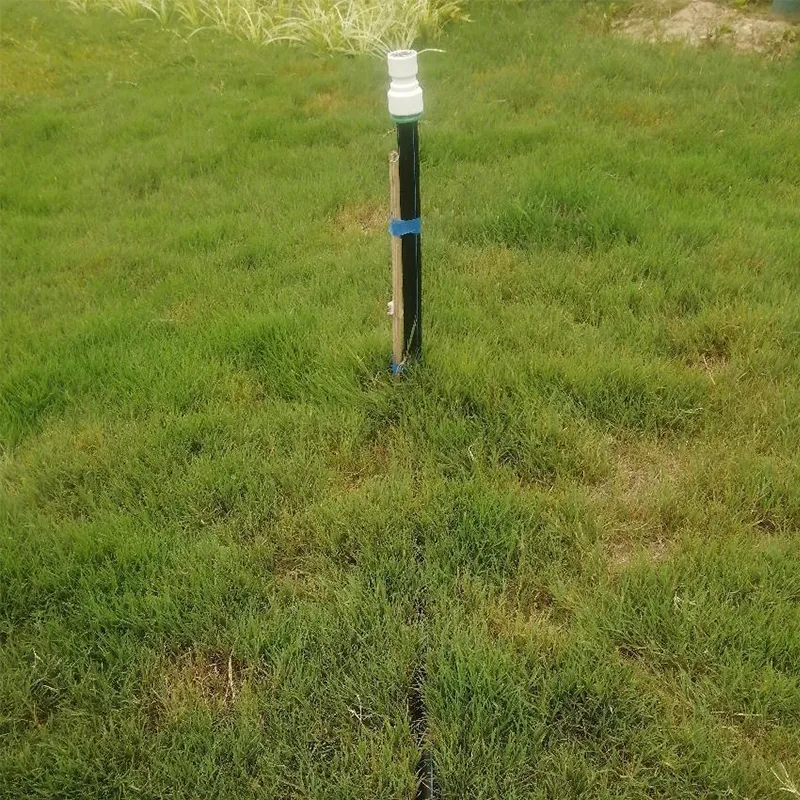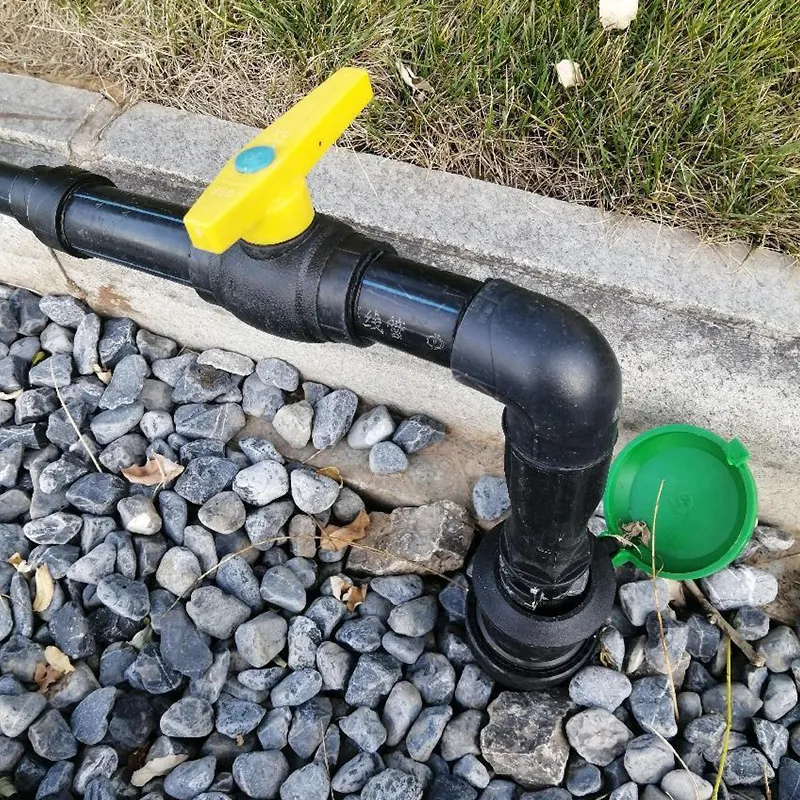Aug . 30, 2025 03:20 Back to list
Premium 32mm HDPE Pipes in Coil: Flexible, Durable, Easy Install
Introduction to 32mm HDPE Pipes in Coil: Reshaping Infrastructure
High-Density Polyethylene (HDPE) pipes have emerged as a cornerstone in modern infrastructure, renowned for their exceptional durability, flexibility, and resistance to corrosion. Among the diverse range of HDPE products, 32mm HDPE Pipes in Coil represent a critical solution for various small to medium-scale fluid transfer applications. Their coiling format offers unparalleled logistical and installation advantages, making them a preferred choice for projects demanding efficiency and reliability. This comprehensive guide delves into the technical intricacies, application versatility, and strategic benefits of these essential piping systems, providing B2B decision-makers and engineering professionals with the insights needed to make informed procurement and deployment decisions. We will explore manufacturing processes, adhere to global testing standards, and present compelling data to underscore their value proposition in demanding industrial and utility environments.
Industry Trends and Market Dynamics
The global market for HDPE pipes is experiencing robust growth, driven by increasing urbanization, industrial expansion, and the urgent need for resilient water and wastewater infrastructure. The demand for flexible and long-lasting piping solutions is particularly pronounced in sectors undergoing rapid development or requiring frequent maintenance. For instance, the agricultural sector, facing pressures to optimize water usage, increasingly adopts coiled HDPE pipes for irrigation systems due to their ease of deployment over vast areas. Similarly, the telecommunications industry utilizes these pipes as conduits for fiber optic cables, capitalizing on their protection capabilities and straightforward installation. The shift towards sustainable and environmentally friendly construction practices also favors HDPE, as its production requires less energy than traditional materials and its recyclability reduces environmental impact. Innovations in material science are leading to enhanced HDPE formulations, offering improved pressure ratings, temperature resistance, and resistance to chemical permeation, further expanding the applicability of solutions like 32mm HDPE Pipes in Coil.
The market is also influenced by stringent regulatory frameworks promoting the use of non-corrosive, leak-proof piping for potable water and hazardous waste transport. This regulatory push, combined with technological advancements in extrusion and coiling techniques, positions HDPE pipes, especially in their convenient coiled format, as a preferred solution for long-distance and challenging installations. Emerging economies, in particular, are seeing significant investment in new infrastructure, creating a substantial demand for cost-effective, durable, and easily transportable piping.
Manufacturing Process: Precision and Quality Assurance
The production of 32mm HDPE Pipes in Coil is a sophisticated process that leverages advanced extrusion technology to ensure product integrity and performance. The journey from raw material to coiled pipe involves several critical stages, each governed by stringent quality control measures.
Process Flow:
- Material Preparation: High-grade HDPE resin, typically PE100 or PE80, is fed into an extruder. These resins are selected for their excellent strength-to-density ratio, impact resistance, and long-term hydrostatic strength. Stabilizers and pigments are added as needed to enhance UV resistance and for identification.
- Extrusion: The HDPE resin is melted and homogenized under controlled temperature and pressure within the extruder barrel. A rotating screw propels the molten polymer through a die, which forms the continuous tubular shape of the pipe. The die precisely dictates the outer diameter (OD) and wall thickness of the 32mm pipe.
- Sizing and Cooling: Immediately after extrusion, the hot pipe enters a vacuum calibration tank, where precise external dimensions are achieved and maintained. Simultaneously, the pipe is cooled rapidly using water baths, solidifying its structure and locking in its dimensions. This stage is crucial for dimensional stability and preventing deformation.
- Haul-off: A haul-off unit, often caterpillar-style, precisely controls the pulling speed of the pipe from the extruder, ensuring consistent wall thickness and preventing stretching or compression, which could compromise mechanical properties.
- Marking and Inspection: The finished pipe is continuously marked with essential information including manufacturer, material type, diameter, wall thickness, pressure rating (e.g., SDR11, PN16), and production date. In-line inspection systems monitor critical parameters like wall thickness, concentricity, and surface quality.
- Coiling: For pipes intended to be in coil form, the continuous pipe is directed to an automatic coiling machine. This machine winds the pipe onto large drums or spools, creating compact and manageable coils, typically in lengths of 50m, 100m, or even longer, depending on client specifications and logistics. The coiling process requires careful tension control to avoid stress on the pipe.
- Final Testing and Packaging: Coiled pipes undergo final quality checks, including hydrostatic pressure tests, melt flow rate (MFR) tests, and impact resistance tests. These adhere to international standards such as ISO 4427 and ASTM F714. Finished coils are then securely strapped and prepared for shipment.
The typical service life for HDPE pipes, when installed correctly and used within their design parameters, often exceeds 50 to 100 years. This longevity is a testament to the robust material properties and meticulous manufacturing.

Technical Specifications and Performance Parameters
The performance of 32mm HDPE Pipes in Coil is defined by a range of critical technical specifications, which are essential for engineers and project managers to consider for optimal system design.
Key Specifications:
- Material: High-Density Polyethylene (HDPE) - PE100 (MRS 10 MPa) or PE80 (MRS 8 MPa).
- Outer Diameter (OD): 32 mm.
- Standard Dimension Ratio (SDR): Common ratios include SDR11, SDR13.6, SDR17, which dictate wall thickness and pressure rating.
- Nominal Pressure (PN): Corresponds to SDR. For example, SDR11 typically supports PN16 (16 bar or 1.6 MPa) for water at 20°C, while SDR17 supports PN10.
- Coil Lengths: Standard options include 50m, 100m, 200m, 500m. Custom lengths are often available.
- Operating Temperature Range: Typically -40°C to +60°C, with pressure de-rating required at higher temperatures.
- UV Resistance: Enhanced with carbon black (usually 2-2.5%) for prolonged outdoor exposure.
- Chemical Resistance: Excellent resistance to a wide range of acids, bases, and salts, making them suitable for aggressive media transport.
- Abrasion Resistance: Superior to many traditional pipe materials, ideal for abrasive slurries.
Product Specification Table: 32mm HDPE Pipes (PE100)
These specifications ensure that the pipes can withstand the intended operating pressures and environmental conditions, providing reliable service life. Compliance with international standards such as ISO 4427 for water supply, EN 12201 for plastic piping systems for water supply, and ASTM F714 for polyethylene pipe is a hallmark of quality manufacturing.

Application Scenarios and Target Industries
The versatility and robust properties of 32mm HDPE Pipes in Coil make them indispensable across a wide array of industries and application scenarios. Their small diameter, combined with the convenience of coils, is particularly advantageous for localized distribution and connections.
Typical Application Scenarios:
- Water Supply & Distribution: Ideal for last-mile connections from main lines to individual homes or agricultural plots, small-scale potable water systems, and rural water initiatives. Their non-toxic nature (FDA/WRAS approved grades available) ensures water quality.
- Irrigation Systems: Widely used in drip irrigation, sprinkler systems, and micro-irrigation for agriculture, horticulture, and landscaping. The coil format reduces the need for numerous joints, minimizing leakage points and speeding up installation.
- Drainage and Sewage: Suitable for small-diameter drainage lines, sewage laterals, and septic system connections, especially in areas where trenchless installation methods might be preferred due to ground conditions or existing infrastructure.
- Telecommunications & Electrical Conduits: Excellent for protecting fiber optic cables and electrical wiring in underground installations. Their smooth interior allows for easy cable pulling, and their flexibility facilitates navigation around obstacles.
- Geothermal Systems: Used as ground loops for small-scale geothermal heating and cooling systems due to their heat transfer capabilities and durability in underground environments.
- Industrial Applications: For conveying low-pressure industrial fluids, non-hazardous chemicals, and compressed air in light industrial settings.
Target Industries:
- Municipal Utilities: Water distribution networks, wastewater collection.
- Agriculture: Irrigation, livestock watering.
- Telecommunications: Cable conduit protection.
- Construction: General utility, temporary water lines, residential connections.
- Mining: Process water, dewatering, ventilation.

Technical Advantages and Economic Benefits
The adoption of 32mm HDPE Pipes in Coil offers a compelling suite of technical and economic advantages that significantly outperform traditional piping materials.
Key Advantages:
- Exceptional Corrosion Resistance: Unlike metallic pipes, HDPE does not rust, rot, or corrode. It is impervious to galvanic and electrochemical reactions, making it ideal for underground installations and aggressive soil conditions, significantly reducing maintenance costs and ensuring long-term integrity.
- High Flexibility and Impact Resistance: The inherent flexibility of HDPE allows pipes to conform to uneven terrain, reducing the need for numerous fittings and directional changes. This flexibility also makes them highly resistant to surge pressures, ground movement, and external impacts, preventing costly breaks common in rigid piping systems.
- Leak-Free Joints: HDPE pipes are joined by heat fusion (butt fusion or electrofusion), creating homogeneous, leak-tight joints that are stronger than the pipe itself. For 32mm pipes, mechanical compression fittings are also highly effective and simple to install, ensuring a robust, sealed system that eliminates water loss and infiltration.
- Coiled Format for Rapid Installation: The availability in coils significantly accelerates installation. Long continuous runs minimize the number of joints required, reducing labor time, equipment needs, and the overall project footprint. This is particularly beneficial for rural or extensive linear projects.
- Excellent Flow Characteristics: The smooth internal bore of HDPE pipes minimizes friction, leading to lower pressure drops and higher flow rates compared to pipes with rougher surfaces or scaling issues. This translates into energy savings for pumping operations.
- Chemical and Abrasion Resistance: HDPE is resistant to a broad spectrum of chemicals, making it suitable for industrial effluent and process lines. Its superior abrasion resistance allows it to effectively handle abrasive slurries, extending service life in challenging applications.
- Sustainability: HDPE is a thermoplastic that can be recycled, contributing to a circular economy. Its long service life also reduces the need for frequent replacements, conserving resources.
These advantages collectively contribute to lower lifecycle costs, reduced environmental impact, and enhanced operational reliability, making 32mm HDPE pipes a shrewd investment for critical infrastructure.
Vendor Comparison and Customization Solutions
Selecting the right vendor for 32mm HDPE Pipes in Coil is crucial for project success. A thorough evaluation should go beyond initial cost, focusing on product quality, adherence to standards, customization capabilities, and post-sales support.
Key Comparison Factors:
Customized Solutions:
Reputable manufacturers understand that off-the-shelf solutions may not always fit unique project requirements. Customized solutions for 32mm HDPE Pipes in Coil can include:
- Specific Coil Lengths: Tailoring coil lengths (e.g., 150m, 300m) to optimize transport and minimize waste for specific project layouts.
- Custom Pressure Ratings: Manufacturing pipes to meet precise pressure requirements, ensuring optimal performance without over-engineering.
- Color Coding: Producing pipes in specific colors for easy identification of different utility lines (e.g., blue for potable water, yellow for gas, green for sewage).
- Special Marking: Including project-specific identification numbers, client logos, or additional compliance information directly on the pipe.
- Integrated Features: Pre-installed tracer wires or specialized inner linings for particular applications.

Application Case Studies and Customer Experience
Real-world deployments demonstrate the tangible benefits of 32mm HDPE Pipes in Coil in diverse and challenging environments.
Case Study 1: Rural Water Distribution Project
A national government initiative aimed at providing potable water to a remote, mountainous region. The project required connecting over 500 households to a central water treatment plant, traversing difficult terrain and numerous small streams.
- Challenge: Long distances, uneven topography, limited access for heavy machinery, and a tight project timeline. Traditional rigid pipes would have required extensive trenching, numerous fittings, and complex logistics.
- Solution: Deployment of 32mm HDPE Pipes in Coil (PE100, SDR11, 200m coils). The pipes were transported by smaller vehicles and even manually, then uncoiled directly into shallow trenches or laid above ground where permissible. Compression fittings were used for rapid, tool-free connections at household junctions.
- Outcome: The project was completed 30% ahead of schedule and 15% under budget. The flexibility of the coiled pipes drastically reduced the need for trenching and specialized equipment, while the minimal number of joints ensured a leak-free system, crucial for water conservation in the region. Customer feedback highlighted the ease of handling and the robust performance of the installed system.
Case Study 2: Agricultural Drip Irrigation Expansion
A large commercial farm sought to upgrade and expand its drip irrigation system across 150 hectares of varied crop fields to improve water efficiency and crop yield.
- Challenge: Covering vast areas with a dense network of sub-laterals, requiring quick installation and excellent resistance to agricultural chemicals and UV exposure. The existing PVC system suffered from frequent breakages and leaks.
- Solution: Implementation of UV-stabilized 32mm HDPE Pipes in Coil (PE80, SDR13.6, 500m coils) for primary drip lines. The coils were deployed using specialized tractor-mounted pipe layers, laying continuous lengths across rows with minimal intervention.
- Outcome: The farm achieved a 25% reduction in water consumption and a 10% increase in crop yield due to improved water distribution and minimized leaks. The HDPE pipes demonstrated superior resistance to UV degradation and fertilizers, leading to a significant reduction in maintenance and repair costs compared to the previous system. The ease of deployment was a major logistical advantage during planting seasons.
These cases underscore the reliability and cost-effectiveness of HDPE coiled pipes, particularly the 32mm variant, in critical infrastructure projects where performance, ease of installation, and longevity are paramount.
Trustworthiness: FAQ, Lead Time, Warranty, and Support
Frequently Asked Questions (FAQ)
-
Q: What is the maximum pressure rating for 32mm HDPE Pipes in Coil?
A: The maximum pressure rating depends on the Standard Dimension Ratio (SDR) and material grade (PE100 or PE80). For PE100, SDR11 pipes typically have a Nominal Pressure (PN) of 16 bar (1.6 MPa) at 20°C. For specific applications, always refer to the manufacturer's data sheets and de-rating factors for higher temperatures.
-
Q: Can these pipes be used for potable water?
A: Yes, provided they are manufactured from virgin, food-grade HDPE resin and hold relevant certifications such as WRAS (Water Regulations Advisory Scheme) or FDA approval. We ensure our pipes meet these standards for safe drinking water applications.
-
Q: What is the recommended installation method for 32mm HDPE pipes in coil?
A: For long, continuous runs, the coiled format is ideal for trenchless installation methods (e.g., directional drilling) or direct burial in open trenches. Connections are typically made using mechanical compression fittings for ease and speed, or electrofusion for permanent, high-integrity joints.
-
Q: How do HDPE pipes compare to PVC pipes in terms of environmental impact?
A: HDPE pipes generally have a lower environmental impact. They require less energy to produce than PVC, are fully recyclable, and their long service life reduces waste. HDPE does not contain plasticizers or stabilizers that can leach into the environment, unlike some PVC formulations.
Lead Time and Fulfillment
Our streamlined manufacturing processes and robust supply chain allow for efficient order fulfillment. Standard orders for 32mm HDPE Pipes in Coil typically have a lead time of 7-14 business days, depending on order volume and specific customizations. For urgent requirements or large-scale projects, we offer expedited production and logistics solutions. We maintain strategic inventory levels of common configurations to facilitate quick turnaround.
Warranty Commitments
We stand behind the quality and durability of our products. All our 32mm HDPE pipes come with a comprehensive 10-year warranty against manufacturing defects and material failures under normal operating conditions. This commitment reflects our confidence in our stringent quality control and the inherent longevity of HDPE pipe systems. Extended warranty options are available for specific projects, subject to agreement.
Customer Support and After-Sales Service
Our dedication to customer satisfaction extends beyond product delivery. Our experienced technical support team is available to assist with product selection, installation guidance, and troubleshooting. We offer:
- Technical Consultation: Expert advice for project planning and pipe specification.
- Installation Training: On-site or virtual training for fusion and fitting techniques.
- Prompt Issue Resolution: Dedicated support channels for rapid response to inquiries or concerns.
- Extensive Documentation: Access to product data sheets, installation manuals, and certification documents.
Our commitment to long-term partnerships ensures that our clients receive continuous support throughout the lifecycle of their projects.
Conclusion
32mm HDPE Pipes in Coil stand as a testament to modern engineering in fluid transfer solutions. Their technical superiority, coupled with the logistical advantages of the coiled format, positions them as an optimal choice for a myriad of applications from potable water distribution to advanced irrigation and conduit systems. The comprehensive benefits—including exceptional corrosion and abrasion resistance, leak-free joints, rapid installation, and remarkable longevity—underscore their value proposition for B2B stakeholders. By prioritizing high-quality manufacturing, adhering to rigorous international standards, and offering robust customization and support, we ensure that our HDPE piping solutions deliver unmatched reliability and cost-effectiveness for your critical infrastructure projects.
References
- International Organization for Standardization. ISO 4427-2:2019. Plastics piping systems for water supply, and for drainage and sewerage under pressure — Polyethylene (PE) — Part 2: Pipes.
- American Society for Testing and Materials. ASTM F714-19. Standard Specification for Polyethylene (PE) Plastic Pipe (SDR-PR) Based on Outside Diameter.
- The Plastic Pipe Institute (PPI). PPI TR-3, Policies and Procedures for Developing Hydrostatic Design Basis (HDB), Pressure Design Basis (PDB), Strength Design Basis (SDB), and Minimum Required Strength (MRS) Ratings for Thermoplastic Piping Materials.
-
DN25 HDPE Compression Fitting: Easy, Leak-Proof Water Connectors
NewsAug.31,2025
-
Durable 140mm PVC Drilling Pipe for Water Wells & Geotechnical
NewsAug.29,2025
-
DN25 PPR Water Pipes for Kitchen: Durable, Safe, Hot Water Ready
NewsAug.28,2025
-
HDPE Tube Pipe In Coil Packaging
NewsAug.22,2025
-
Kitchen Sink Water Lines 2.5Mpa Pressure Resistance
NewsAug.22,2025

